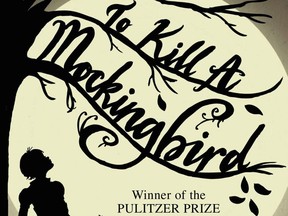Why Do We Read to Kill a Mockingbird
Shannon: Here's why we teach To Impale a Mockingbird

The Pare Commune Schoolhouse board has recommended that its teachers non teach To Kill A Mockingbird.
Although the board argues that is not a ban of the book, teachers are reacting. As a retired educator with 30 years of experience every bit an English teacher, at both the school and district level, I have many concerns with the recommendation and with the procedure, as it undermines the professionalism of teachers and ignores the purpose of teaching literature.
To Kill A Mockingbird is about discrimination – racial, economic and the fear of the unknown. Information technology is about a child's coming of age as she learns this lesson. Yes, the book depicts racism; it does not promote it or ignore information technology. Equally all literary works depict conflict, it would be impossible to propose that we avoid whatever literary work that portrays evil. The truthful learning backside didactics literature comes from the study and give-and-take of these profound issues. To Kill A Mockingbird teaches the value of empathy and agreement differences. The novel offers excellent learning opportunities such every bit discussion, role-playing, and historical research, allowing students to delve into these issues and appreciate them and the work itself.
The historical context of the novel is crucial, as the volume non only introduces teenagers to the problems of the past, but also leads them to make connections to the world in which they live today, making this decades-old work very relevant. Fifty-fifty the objectionable language decried past some is an excellent "teachable moment" and a gamble to talk about why language evolves over time. Having an open and honest give-and-take well-nigh this is essential in understanding the context and providing an atmosphere of respect and trust.
An argument against the book is that students may experience uncomfortable with the topic. Obviously, nosotros want our students to experience respected and physically safe. But information technology is condign a disturbing trend, even in post-secondary education, to avoid issues that will provoke reactions. It is simply by discussing these bug and reacting to emotions in a safe classroom surround, amongst students of different racial groups, and with a teacher's leadership, that students will learn from the work itself, and from each other, and exist able to make sense of such problems in a circuitous world.
Deciding on literary texts is a rigorous and ongoing process, both at the school and the district level. It is generally collaborative and fluid, with educators at various levels giving input to generate choices, and discussion is always actively encouraged.
The Peel District School Board's recent directive perplexes me. As someone who has worked at the board level, I saw my function every bit someone who supported teachers. I am dismayed past what could be interpreted every bit a lack of trust towards those at the school level. It is footling wonder that teachers in schools are reacting negatively and believing that their professional judgment volition not be supported. The idea that teachers must present lesson plans to principals if they want to teach this volume is not only insulting to professionals who have successfully used this novel, but also highly impractical.
A high school principal only does not have fourth dimension to check daily lesson plans of each staff member. Singling out teachers who want to use this book is an alarming concept. Certainly, lesson and unit planning is something that should be, and is, discussed within an English section, merely as a section head, ultimately, I had organized religion in my colleagues' professionalism within their ain classrooms.
So, why non choose another volume? Many accept argued, and rightly so, that other skilful options exist. Could we not cull something more recent, or something Canadian? Perhaps. These are reasonable questions. As teachers, we aim for balance in our literary offerings and the days of instruction only approved literature are long gone.
But why non teach this ane if it offers rich opportunities to explore the issues and the history, while offering students the chance to read this classic? Though we try to offering varied and independent choices in club to encourage a love of reading, sometimes the teacher is going to make the telephone call, for adept reasons, and using his or her professional judgment. In the stop, for educators, it is about student engagement and learning, and the decision processes we make to ensure that.
Denise Shannon is a recently retired English teacher with the Ottawa Catholic School Board. Over the course of her career, she taught high school English, was a department head, a board program consultant, and taught a Senior English language Pedagogy Methods course in the Kinesthesia of Education at the University of Ottawa.
williamscondets1989.blogspot.com
Source: https://ottawacitizen.com/opinion/columnists/shannon-heres-why-we-teach-to-kill-a-mockingbird#:~:text=To%20Kill%20A%20Mockingbird%20teaches,them%20and%20the%20work%20itself.

0 Response to "Why Do We Read to Kill a Mockingbird"
Enregistrer un commentaire